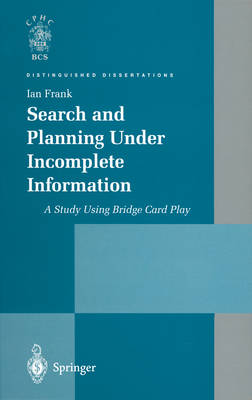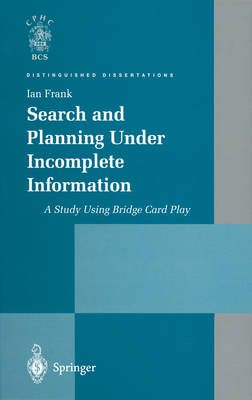
- Afhalen na 1 uur in een winkel met voorraad
- Gratis thuislevering in België vanaf € 30
- Ruim aanbod met 7 miljoen producten
- Afhalen na 1 uur in een winkel met voorraad
- Gratis thuislevering in België vanaf € 30
- Ruim aanbod met 7 miljoen producten
Zoeken
€ 153,95
+ 307 punten
Omschrijving
This book updates the thesis I produced for my PhD at the Department of Artificial Intelligence of the University of Edinburgh, correcting errors, and improving some of the formatting and readability. Since the original work was completed (early 1996), research has progressed. Most notably, the public profile of AI and game-playing has reached new heights with the feats of the chess computer DEEPER BLUE (which surely uses AI, no matter what IBM would have us believe). Although less heralded, the ability of computers to play Bridge (the main example domain in this book) has also increased. In July of 1997 a world championship for computer Bridge programs was hosted by the American Contract Bridge League in Albuquerque, New Mex- ico. This contest was won by a program called Bridge Baron, produced by Great Game Products. Bridge Baron incorporates knowledge-based planning techniques developed by Stephen Smith and Dana Nau [1, 2]. Progress has also been made on the contrasting, more brute-force, approach of sampling the possible card distributions. In particular, Matt Ginsberg has developed a fast double-dummy solver based on partition search [3]. Ginsberg's program fared poorly in the 1997 Bridge championships, but Ginsberg himself reports very promising results [4] on a hard set of complete Bridge deals taken from the Bridge tutoring program Bridge Master.
Specificaties
Betrokkenen
- Auteur(s):
- Uitgeverij:
Inhoud
- Aantal bladzijden:
- 340
- Taal:
- Engels
- Reeks:
Eigenschappen
- Productcode (EAN):
- 9781447115960
- Verschijningsdatum:
- 7/12/2011
- Uitvoering:
- Paperback
- Formaat:
- Trade paperback (VS)
- Afmetingen:
- 156 mm x 244 mm
- Gewicht:
- 575 g

Alleen bij Standaard Boekhandel
+ 307 punten op je klantenkaart van Standaard Boekhandel
Beoordelingen
We publiceren alleen reviews die voldoen aan de voorwaarden voor reviews. Bekijk onze voorwaarden voor reviews.











